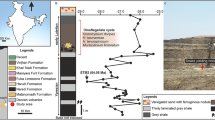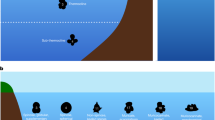Abstract
BETWEEN October 1958 and September 1959 two panels of ‘Tuffnol’, each 2 ft. square, were suspended on either side of a raft at Port Royal, Jamaica. The purpose of these panels was to collect data on the settlement of an ascidian, Ascidia nigra. Each panel was examined at 2-monthly intervals, the two panels being examined on alternate months. When a panel had been examined it was cleaned before replacement on the raft. In this way a fresh settlement surface was provided each month. In the course of the two months in which a panel was exposed a dense growth of sessile animals always developed on it, usually dominated by Balanus amphitrite and Didemnum maculosum, with smaller numbers of other ascidians (A. nigra, Diplosoma macdonaldi, Symplegma viride, Polyclinum constellatum), serpulid worms, lamelli-branchs, bryozoans and the alga Enteromorpha sp.
This is a preview of subscription content, access via your institution
Access options
Subscribe to this journal
Receive 51 print issues and online access
$199.00 per year
only $3.90 per issue
Buy this article
- Purchase on Springer Link
- Instant access to full article PDF
Prices may be subject to local taxes which are calculated during checkout
Similar content being viewed by others
Author information
Authors and Affiliations
Rights and permissions
About this article
Cite this article
GOODBODY, I. Inhibition of the Development of a Marine Sessile Community. Nature 190, 282–283 (1961). https://doi.org/10.1038/190282a0
Issue Date:
DOI: https://doi.org/10.1038/190282a0
This article is cited by
-
Influence of sponges on invertebrate recruitment: A field test of allelopathy
Marine Biology (1991)
-
Larval depletion by ascidians has little effect on settlement of epifauna
Marine Biology (1989)
-
Exudation of biologically-active metabolites in the sponge Aplysina fistularis
Marine Biology (1985)
-
Allelopathic interaction between a reef coelenterate and benthic algae
Oecologia (1984)
-
Factors affecting the spatial distributions of thinly encrusting sponges from temperate waters
Oecologia (1983)
Comments
By submitting a comment you agree to abide by our Terms and Community Guidelines. If you find something abusive or that does not comply with our terms or guidelines please flag it as inappropriate.



